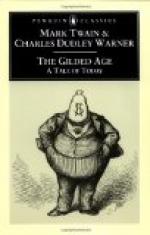CHAPTER XLVII.
Philip’s first effort was to get Harry out of the Tombs. He gained permission to see him, in the presence of an officer, during the day, and he found that hero very much cast down.
“I never intended to come to such a place as this, old fellow,” he said to Philip; “it’s no place for a gentleman, they’ve no idea how to treat a gentleman. Look at that provender,” pointing to his uneaten prison ration. “They tell me I am detained as a witness, and I passed the night among a lot of cut-throats and dirty rascals—a pretty witness I’d be in a month spent in such company.”
“But what under heavens,” asked Philip, “induced you to come to New York with Laura! What was it for?”
“What for? Why, she wanted me to come. I didn’t know anything about that cursed Selby. She said it was lobby business for the University. I’d no idea what she was dragging me into that confounded hotel for. I suppose she knew that the Southerners all go there, and thought she’d find her man. Oh! Lord, I wish I’d taken your advice. You might as well murder somebody and have the credit of it, as get into the newspapers the way I have. She’s pure devil, that girl. You ought to have seen how sweet she was on me; what an ass I am.”
“Well, I’m not going to dispute a poor, prisoner. But the first thing is to get you out of this. I’ve brought the note Laura wrote you, for one thing, and I’ve seen your uncle, and explained the truth of the case to him. He will be here soon.”
Harry’s uncle came, with; other friends, and in the course of the day made such a showing to the authorities that Harry was released, on giving bonds to appear as a witness when wanted. His spirits rose with their usual elasticity as soon as he was out of Centre Street, and he insisted on giving Philip and his friends a royal supper at Delmonico’s, an excess which was perhaps excusable in the rebound of his feelings, and which was committed with his usual reckless generosity. Harry ordered, the supper, and it is perhaps needless to say, that Philip paid the bill.
Neither of the young men felt like attempting to see Laura that day, and she saw no company except the newspaper reporters, until the arrival of Col. Sellers and Washington Hawkins, who had hastened to New York with all speed.
They found Laura in a cell in the upper tier of the women’s department. The cell was somewhat larger than those in the men’s department, and might be eight feet by ten square, perhaps a little longer. It was of stone, floor and all, and tile roof was oven shaped. A narrow slit in the roof admitted sufficient light, and was the only means of ventilation; when the window was opened there was nothing to prevent the rain coming in. The only means of heating being from the corridor, when the door was ajar, the cell was chilly and at this time damp. It was whitewashed and clean, but it had a slight jail odor; its only furniture was a narrow iron bedstead, with a tick of straw and some blankets, not too clean.




